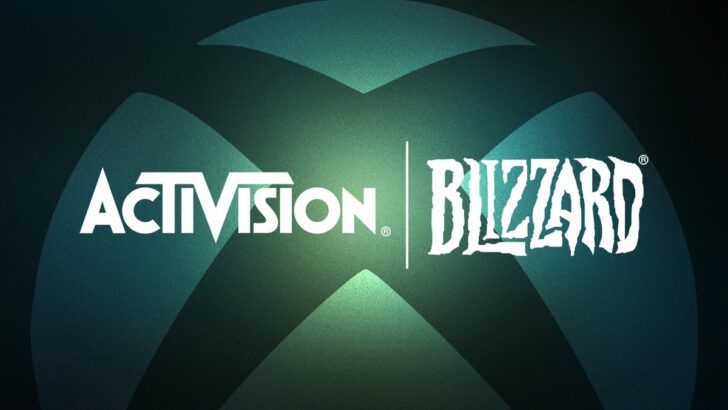Activision Blizzard Acquisition: FTC's Appeal Against Microsoft

Table of Contents
The FTC's Arguments Against the Merger
The FTC's opposition to the Microsoft Activision Blizzard deal rests on two primary pillars: concerns about competition within the gaming market and apprehensions regarding data privacy and consumer protection.
Concerns about Competition in the Gaming Market
The FTC argues that the Activision Blizzard Acquisition would give Microsoft undue market dominance, stifling competition, particularly in the console gaming market. Activision Blizzard boasts immensely popular franchises like Call of Duty, World of Warcraft, and Candy Crush, each holding significant market share. The FTC fears that Microsoft could leverage this acquisition to engage in anti-competitive practices, creating a monopoly and potentially leading to:
- Reduced choice for gamers: Microsoft could make Activision Blizzard titles exclusive to Xbox, limiting player access on other platforms. The threat of Call of Duty exclusivity, for example, is a major concern.
- Higher prices for games and consoles: Reduced competition could lead to inflated prices for games and even gaming consoles.
- Suppression of innovation: A lack of competition often stifles innovation as companies lack the incentive to improve their products or services. The market dominance achieved through this merger could stifle innovation in the gaming industry.
Concerns Regarding Data Privacy and Consumer Protection
Beyond competitive concerns, the FTC also expresses anxieties about the implications for data privacy and consumer protection. The merger would grant Microsoft access to an enormous amount of user data collected by Activision Blizzard. This raises concerns about:
- Access to vast amounts of user data: Combining Activision Blizzard's user data with Microsoft's extensive data holdings raises significant data security concerns.
- Potential for targeted advertising and manipulation: This aggregated data could be used for highly targeted advertising, potentially manipulating user behavior.
- Risks to user privacy and security: The sheer volume of sensitive user information raises serious concerns about potential breaches and misuse. This directly impacts antitrust laws designed to protect consumers.
Microsoft's Defense and Counterarguments
Microsoft vehemently denies the FTC's claims, arguing that the Activision Blizzard Acquisition will ultimately benefit consumers and enhance the competitive landscape.
Microsoft's Claims of Benefits for Consumers
Microsoft counters that the merger will increase game availability, offering Activision Blizzard titles on more platforms, including through its Xbox Game Pass subscription service. This, they contend, will translate to:
- Increased accessibility to games: More gamers will have access to popular titles.
- Potentially lower subscription costs: The inclusion of Activision Blizzard games could justify lower subscription prices for Xbox Game Pass.
- Investment in game development and innovation: Microsoft plans to invest heavily in Activision Blizzard's existing franchises and the development of new games. This investment could lead to improvements and innovations within the gaming industry.
Addressing the FTC's Anti-Competitive Concerns
Microsoft has actively tried to address the FTC's anti-competitive concerns by offering various concessions and remedies. These include:
- Agreements to license games to competitors: Microsoft has pledged to license key titles like Call of Duty to other platforms, ensuring continued availability outside the Xbox ecosystem.
- Commitment to maintaining cross-platform compatibility: This commitment aims to avoid creating a fragmented gaming environment.
- Investment in smaller game studios: Investing in smaller game studios fosters competition and diversity within the gaming industry. This proactive step aims to address concerns regarding the competitive landscape.
The Appeal Process and Potential Outcomes
The FTC's appeal against the Activision Blizzard Acquisition is currently underway. This antitrust litigation involves complex legal proceedings that could unfold over several months, even years. Potential outcomes range from the acquisition being completely blocked to the deal receiving approval, potentially with conditions attached.
- Timeline for the appeal process: The exact timeline is uncertain, depending on the courts’ schedule and the complexity of the case.
- Potential impact on the gaming industry: The decision will have far-reaching implications, shaping the future of mergers and acquisitions in the gaming industry.
- Implications for future mergers and acquisitions in the tech sector: The outcome will set a precedent for future mergers and acquisitions within the technology sector.
Conclusion: The Future of the Activision Blizzard Acquisition and its Impact
The Activision Blizzard Acquisition case presents a clash between the FTC's concerns regarding competition and data privacy and Microsoft's claims of consumer benefits and market expansion. The ongoing legal proceedings and the eventual court decision will significantly influence the future of the gaming industry. The uncertainty surrounding the appeal highlights the complexities of regulating mergers in the rapidly evolving tech landscape. Stay informed about the developments in the Microsoft's acquisition of Activision Blizzard case and its ramifications for the future of gaming. Understanding the intricacies of this Activision Blizzard merger is vital for anyone interested in the gaming industry’s evolution.

Featured Posts
-
 Retro Trainers Back In Style Thanks To Suki Waterhouse
May 06, 2025
Retro Trainers Back In Style Thanks To Suki Waterhouse
May 06, 2025 -
 Fortnite Season Season Number Guide New Weapons Locations And Challenges
May 06, 2025
Fortnite Season Season Number Guide New Weapons Locations And Challenges
May 06, 2025 -
 Find Your Perfect Wedding Night Look With Rihannas Savage X Fenty
May 06, 2025
Find Your Perfect Wedding Night Look With Rihannas Savage X Fenty
May 06, 2025 -
 Obtaining Sabrina Carpenter Fortnite Outfits A Step By Step Guide
May 06, 2025
Obtaining Sabrina Carpenter Fortnite Outfits A Step By Step Guide
May 06, 2025 -
 Gypsy Rose Blanchards Net Worth And Post Prison Earnings
May 06, 2025
Gypsy Rose Blanchards Net Worth And Post Prison Earnings
May 06, 2025
